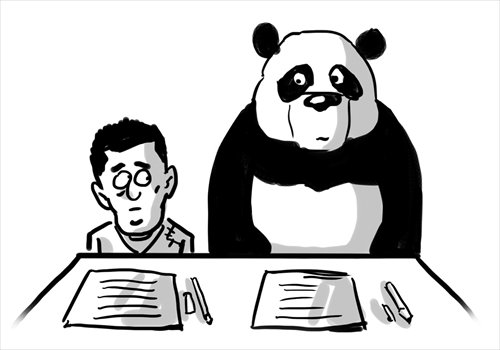 Close-up view of August Aerobatic Team
Close-up view of August Aerobatic Team
 Goddesses married in 2014
Goddesses married in 2014
 Polar region photos raise worldwide awareness of global warming
Polar region photos raise worldwide awareness of global warming
 Get off at the last stop — Beijing Subway in vision
Get off at the last stop — Beijing Subway in vision
 Top 100 beauties in the world!
Top 100 beauties in the world!
 Gallery: Who is the most beautiful one?
Gallery: Who is the most beautiful one?
 If you like autumn, put your hands in the air!
If you like autumn, put your hands in the air!
 Fan Bingbing's "Queen style" in new play
Fan Bingbing's "Queen style" in new play
 Lingerie show at 2014 Miss China
Lingerie show at 2014 Miss China
 J-10 fighters show aerobatic stunts in smog-free sky
J-10 fighters show aerobatic stunts in smog-free sky

Illustration: Liu Rui/GT
Voices calling for a rethinking of China-North Korea relations have been rising in recent years. Clamors for "giving up" the North occur in Chinese public opinion from time to time, and are even adopted by some Chinese strategic scholars as suggestions. After 65 years since the establishment of diplomatic ties between the two, there are still enormous differences on how to tackle the bilateral relations.
Those who propose the idea of "giving up" North Korea mainly cite two reasons.
They argue that traditional geopolitical concept has been outdated and a modern war no longer needs a geopolitical barrier, so the North is deprived of the role to serve as a barrier for China.
But if this theory holds water, why does the US keep stepping up its military presence in Japan and South Korea, instead of withdrawing its troops from there? The Korean Peninsula still boasts a unique geopolitical value.
These people also argue that given a wide spectrum of contradictions, conflicts and disputes, the North is a frequent troublemaker and actually a burden to China.
This reason may sound more provocative, but is no more than a superficial phenomenon. It can barely stand up to close scrutiny.
China and North Korea are two sovereign states with different national interests, so it is hard for them to coordinate well on everything. Even two allies can experience contradictions and disputes at times. The key of the problem here lies in identifying the nature of the contradictions and taking corresponding measures.
Furthermore, China's discrepancies with North Korea at present are completely different from its conflict with Japan. Sino-Japanese conflicts involving territorial disputes, historical attitudes and regional geopolitical architecture are largely irreconcilable.
Meanwhile, Beijing-Pyongyang ties are unlikely to repeat the blunder of the split between China and the Soviet Union. China is not the Soviet Union and has no intention to control the North.
Committed to a socialist political system, North Korea can hardly find another country to replace China geopolitically. Both sides need to further consolidate their mutual friendship.
A legacy of the Cold War in essence, the issue of North Korea is closely related to the Korean Armistice Agreement and the US-South Korea alliance. Sometimes Pyongyang has to fight single-handedly to ensure its own survival and security. As long as these two factors persist, the conundrum will hardly be addressed and Sino-North Korean relations will surely be affected.
Even so, Beijing and Pyongyang have consistent fundamental interests on the geopolitical front, which will not change without major vicissitudes in Northeast Asian geopolitics.
If China really "abandons" North Korea, three scenarios may occur.
One is that Pyongyang will draw closer to a third state.
The second is that it could collapse due to political, economic and military siege and suppression by its enemies.
Or, the country could be mired in a more isolated impasse and wage a life-and-death battle. The Korean Peninsula would probably go through another bloody catastrophe.
None of the three consequences will be in China's interests. If one of these happens, the Korean Peninsula may once again fall into the hands of the great maritime powers.
The First Sino-Japanese War of 1894-95 was caused by the fierce scramble for the peninsula between China and Japan. Its repercussions still influence the present international order.
Now the US has replaced Japan as a super maritime power to regulate the order of this strategically important peninsula. Therefore, if Beijing "gives up" Pyongyang, Washington will likely gain the strategic interests it failed to seize during the Korean War. We must guard against sending this grand "gift" to the US owing to strategic misjudgment.
The author is a Korean studies scholar with Zhejiang University. opinion@globaltimes.com.cn
(For the latest China news, please follow @PDChina on Twitter at http://www.twitter.com/PDChina and @PeoplesDaily on Facebook at http://www.facebook.com/PeoplesDaily)
 Court ruling needed to push Constitution
Court ruling needed to push Constitution Hong Kong protest leaders surrender
Hong Kong protest leaders surrender Not so Forbidden City
Not so Forbidden City Lawyers provide free legal help to exonerate wrongfully convicted individuals
Lawyers provide free legal help to exonerate wrongfully convicted individualsDay|Week|Month